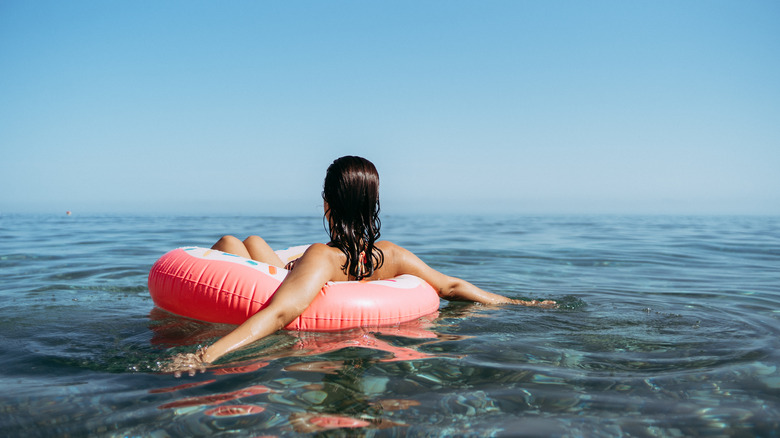The Scientific Meaning Of 'Blue Health' Will Have You Booking A Beach Vacation ASAP
Travel isn't just about racking up passport stamps or humblebragging on Instagram — it's also a great way to boost your health. And no, we're not talking about fancy health retreats or the health tourism trend. As it turns out, a getaway can actually reduce stress and anxiety, giving your mental health a serious glow-up. But if you really want to level up the wellness perks, pack your bags and head to a body of water. Science calls this "blue health," and yes, it's exactly what it sounds like: Water-based environments can significantly improve your well-being. Who knew all that "vitamin sea" talk actually had substance and not just some corny Pinterest quote?
Back in the 18th century, doctors actually sent patients to the seaside to cure "melancholy" and "spleen" — basically the original terms for being moody and over it. Their logic was a bit off (they thought these ailments were caused by black bile), but they were onto something. Modern science, however, has caught up. A study in Science of the Total Environment found that hanging around "blue spaces" like oceans and lakes can restore your mental energy, reduce stress, and even improve your breathing — apparently, the air really is fresher by the water.
And it's not just about being near the water or submerging yourself in it — it's about seeing it, too. Even just looking at water has a calming effect. "The color blue has been found by an overwhelming amount of people to be associated with feelings of calm and peace," Richard Shuster, doctor of psychology and clinical psychologist, explained to NBC News. "Staring at the ocean actually changes our brain waves' frequency and puts us into a mild meditative state." Basically, a beach day is a free therapy session. How does booking a trip sound?
Being near a body of water is good for you
Whether you're jetting off to a world-famous beach or sticking closer to home in the Florida Keys' secret spots, a coastal vacation is basically a win-win for your well-being. According to James Grellier, an environmental epidemiologist, water works wonders on your mood. He told The Washington Post that spending time near water enables you to "relax and restore your cognitive processes." In other words, water equals instant chill. What's more, listening to waves lapping against the shore can be soothing, too, because, as Grellier puts it, "the sound of water, for example, is known to be more relaxing than urban noise."
But the benefits of blue health aren't limited to mental and physical benefits. Marine biologist Wallace J. Nichols, author of "Blue Mind," explained to USA Today that water's magic can seep into other aspects of your life. "We've found that being near water boosts creativity, can enhance the quality of conversations and provides a backdrop to important parts of living — like play, romance and grieving," he said. "All of this depends on these waters being safe, clean and healthy, of course."
And if you're landlocked or too far from the sea, don't despair. Even a fountain can deliver a slice of those blue health benefits, according to Dr. Lewis Elliott, an environmental psychologist. He shared with The Guardian, "You can't change where the coast is, but when we're talking about translating the benefits to other types of environments, there is nothing to stop a well-designed urban fountain." So, whether it's crashing waves at the shore or a city fountain doing its thing, water is basically nature's therapist. It just doesn't quench your thirst — it quenches your soul, too.

